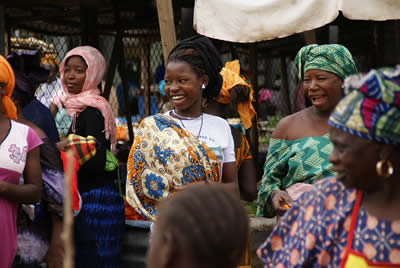A landmark UNCTAD online training course for East Africa has won plaudits from participants, who say it will help them etch gender concerns into trade policies.
The debut edition of the eight-week programme on Trade and Gender Linkages in the East African Community wrapped up on 15 July. A total of 86 people – a mix of government officials, as well as representatives of trade associations and women’s groups, and academics – enrolled in the free course, which was sponsored by Trade Mark East Africa.
“The course has enabled me to answer some questions I have been struggling with as I implement the women in trade project, for example, why women need to be considered as trade policies are being made,” said Ugandan participant Ruth Warutere, a project officer at the Eastern African Sub-regional Support Initiative for the Advancement of Women.
For James Muriuki, principal business development and projects officer at the Kenya Bureau of Standards, “The course expanded my knowledge, and the new concepts will be very important in the development of future policies and development programmes.”
Economic policies impact different segments of the population, including men and women, in different ways. In turn, gender inequalities impact on trade policy outcomes and economic growth. Taking into account gender perspectives in macro-economic policy, including trade policy, is essential to pursuing inclusive and sustainable development and to achieving fairer and beneficial outcomes for all.
UNCTAD plays a key role in ensuring that gender considerations are incorporated in a meaningful way in trade policies.
Its Trade, Gender and Development programme supports its member countries in:
-
Assessing the distinct effect of economic policies, especially trade policy, on men and women, boys and girls; identifying gender-based constraints that impede inclusive development; and devising strategies and policy measures to overcome them.
-
Mainstreaming gender into trade policy through the inclusion of gender considerations in policy formulation and implementation, and in the negotiations of trade and other agreements at the multilateral, regional and bilateral levels.
Curbing inequalities
“Curbing inequalities is a top priority for the United Nations as a whole and makes good economic sense. Trade is an important area for achieving this,” said Simonetta Zarrilli, who runs UNCTAD’s Trade, Gender and Development programme.
“Training is a key means to ensure that gender concerns are part of trade policy creation,” she added.
The course for the East African Community – the members of which are Burundi, Kenya, Rwanda, South Sudan, the United Republic of Tanzania, and Uganda – is the second regional one run by UNCTAD. The first, which targeted the 21-nation Common Market for Eastern and Southern Africa, was held in 2017.
Additional courses are in the pipeline for the 16-member South African Development Community and the four-member South American trade bloc, Mercosur.
A global perspective
The regional courses are tailored versions of UNCTAD’s annual global course on trade and gender, launched in 2015. Since then, a total of 576 people from 109 countries have received the training, at the global and regional levels combined.
“Understanding that trade is not gender neutral is crucial to work in this area and to understand many of the impacts too,” said participants Carlos Farias from the Gender Mainstreaming Task Force at Argentina’s Ministry of Foreign Affairs.
Sonali Samarasinghe, minister counsellor at Sri Lanka’s Permanent Mission to the United Nations in New York, also took the course.
“I am very thankful to UNCTAD for this e-learning platform. It allows professionals like us with huge workloads to enhance our knowledge and update our skills,” she said.
This year’s global course also ended on 15 July and, like the previous editions, was supported by Finland.
Nordic countries are notable supporters of UNCTAD’s work on trade and gender.
Sweden, for example, supported UNCTAD’s Trade and Gender Toolbox, which was launched in 2017 and helps countries assess how trade agreements and other trade measures might impact women before their implementation.

